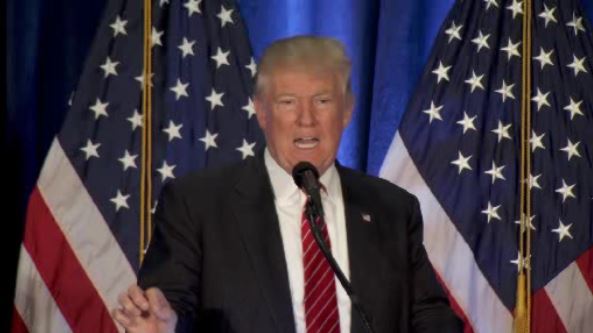WASHINGTON (AP) — Donald Trump has called Russian President Vladimir Putin “a leader — unlike what we have in this country.”
But most Americans don’t agree with Trump’s assessment of Putin’s leadership skills, a new Associated Press-GfK poll shows.
Only 24 percent of registered voters say Putin has leadership qualities that would be good for an American president to share, while 71 percent say he does not. In fact, a majority, 56 percent, said they have an unfavorable view of Putin, while only 10 percent said they view the Russian leader favorably.
Voters were split on whether Trump would be too close to Putin, with 42 percent saying they think Trump would be too close, and 41 percent saying his approach would be about right. Fourteen percent think he would not be close enough.
By comparison, most voters (53 percent) think Democrat Hillary Clinton’s relationship with Putin would be about right, while 11 percent think she would be too close and 32 percent think she would not be close enough.
The relationship between the Republican nominee and the Russian strongman began taking on new life when Putin praised Trump last December as “bright and talented” and “the absolute leader of the presidential race.”
The billionaire businessman hailed Putin’s regard for him as a “great honor,” brushing off widespread allegations that the Russian president has ordered the killing of political dissidents and journalists.
“Our country does plenty of killing also,” Trump told MSNBC’s “Morning Joe” in December.
Four in 10 Trump supporters and only 1 in 10 Hillary Clinton supporters say Putin has leadership qualities that would be good for an American president to have. Still, even among Trump’s supporters, just 16 percent have a favorable opinion of Putin. Only 5 percent of Clinton’s supporters do.
Marissa Garth, a 28-year-old stay-at-home mom from Smithfield, Utah, said she plans to vote for Trump this November because he exhibits the qualities of a strong leader — not to be compared with Putin.
“I think (Putin) is a strong leader for his country,” she said. “But at the same time I don’t think he necessarily has the qualities that I would want as a president.”
In fact, the poll finds that men are more likely than women to say that Putin has leadership qualities that would be good in an American president, 28 percent to 19 percent.
Among Clinton’s supporters, 69 percent say Trump would be too close to Putin. Forty-nine percent of those supporting another candidate share that view, but only 8 percent of Trump supporters say their candidate would be too close to Putin. Eighty percent of Trump supporters say his approach would be about right. Among conservatives, 20 percent say Trump would be too close to Putin.
There is nothing 54-year old Gary Sellers, of Homewood, Illinois, likes about Putin — or Trump. He called Putin a “dictator,” adding, “there are no qualities of his that I wish that an American president would have.”
A lukewarm Clinton supporter, he’s concerned that Trump shares Putin’s extreme views of governing. “I feel he has a dictatorial approach toward being president of the United States,” Sellers said of Trump.
Forty-seven percent of voters say they approve and 52 percent disapprove of President Barack Obama’s handling of the U.S. relationship with Russia.
Voters are divided over whether the next president should take a tougher approach to Putin (42 percent) or whether the current approach is about right (39 percent). Just 16 percent think the next president should take a friendlier approach.
Just under half of voters (48 percent) say the U.S. relationship with Russia is a very or extremely important issue, ranking it low on Americans’ list of priorities, far below issues like the economy (92 percent), the threat posed by the Islamic State group (70 percent), the U.S. role in world affairs more generally (68 percent) and immigration (60 percent).
There’s a generational divide over Russia. Two-thirds of voters age 65 and over and more than half of those between 50 and 64 call the U.S. relationship with Russia very or extremely important, while only 4 in 10 30-49 year olds and only a third of those under 30 say the same.
Generally speaking, voters are more likely to say they trust Clinton than Trump on negotiating with Russia, 40 percent to 33 percent. Nineteen percent say they trust neither and 7 percent trust both equally.
John Eppenger, 68, a retiree in Fairfield, Ala., said that when it comes to dealing with Russia, Clinton would “do a much better job than Trump. She’s not perfect, she’s not ideal, but she’s better.”
——
The AP-GfK Poll of 1,694 adults, including 1,476 registered voters, was conducted online Sept. 15-19, using a sample drawn from GfK’s probability-based KnowledgePanel, which is designed to be representative of the U.S. population. The margin of sampling error for all respondents is plus or minus 2.5 percentage points, and for registered voters is plus or minus 2.5 percentage points.
Respondents were first selected randomly using telephone or mail survey methods and later interviewed online. People selected for KnowledgePanel who didn’t have access to the internet were provided access for free.
——
Online:
Poll results: http://ap-gfkpoll.com
Copyright 2024 The Associated Press. All rights reserved. This material may not be published, broadcast, rewritten or redistributed.

